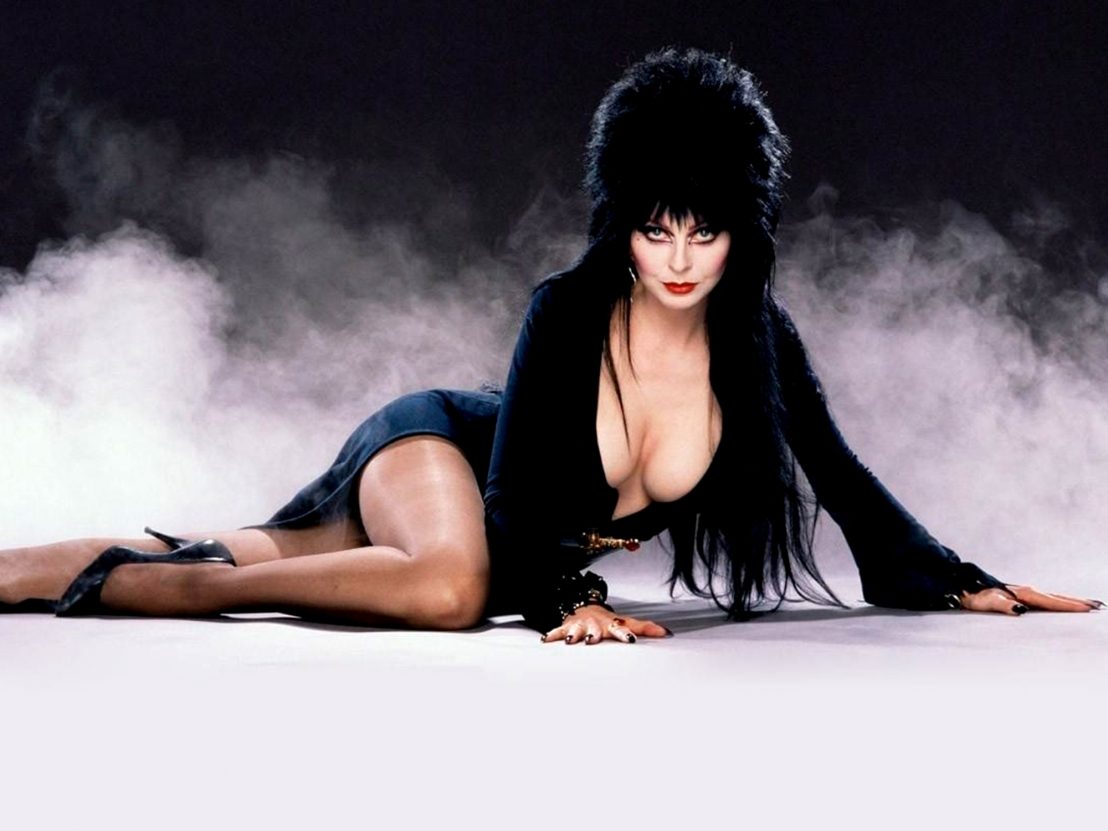
James Signorelli’s Elvira: Mistress of the Dark is a film full of dualities and ironies, where things tend to come in pairs. First there is the titular heroine Elvira, appearing, according to the closing credits, “as herself”, but in fact the brainchild and alter ego of Cassandra Peterson, who had been playing hostess to B-horror TV show Elvira’s Movie Macabre in this sexy/snide persona since 1981, and who co-wrote the film (along with Sam Egan and John Paragon).
Elvira’s first big-screen outing begins in full meta mode, with her filming one of her small-screen outings, as she presents – and affectionately ridicules – Roger Corman’s cheapo sci-fi schlocker from 1956, It Conquered the World. Appearing in her trademark low-cut black dress, and in her black-dyed hairstyle that improbably merged a ’50s beehive and an ’80s mullet (bridging the decade of cinema that her show celebrated, and the decade in which it was broadcast), Elvira is all sarky, smutty sex positivity, making a prominent display of her two best assets: her verbal wit, and her ability to laugh at everything and everyone including, first and foremost, herself.
Fired after refusing to grant sexual favours to the station’s new owner, Elvira hopes to take up a new gig in Vegas, but must first travel to Fallwell in Massachusetts, where her great aunt Morgana Talbot (also played by Peterson in flashbacks) has recently died, leaving Elvira an inheritance. Desperate for cash, Elvira tries to make over and sell on Morgana’s dusty, dilapidated mansion, while working out what to do with the mysterious cookbook and the white puppy (Algonquin, or ‘Gonk’) that form the rest of her legacy – even as creepy great uncle Vincent (W Morgan Sheppard) shows an unusual interest in the tome of recipes.
Meanwhile, stuck in a small-town throwback to the kind of wholesome ’50s values (with darker undercurrents) that were prevalent in the films that she typically presents, Elvira finds herself both a misfit, and fitting right in, as the archetypal bad girl and ‘witch’.
This is where the ironies begin to abound. For while Elvira certainly talks the talk of promiscuity in an endless stream of hilarious sexual innuendo and double entendre, she remains a paradoxical model of innocence and unavailability, easily fending off the groping advances of any number of lecherous admirers while struggling to get as much as a chaste kiss from the latest object of her own affections, local cinema owner and all-round hunk Bob Redding (Daniel Greene).
In other words, Elvira somehow manages, after her own fashion, to embody the very puritanism that she is accused of subverting. She may offer a revealing décolletage, but she is, so to speak, all cleavage and no nipples – and heaven help anyone who tries to lay their filthy paws on her goods. Meanwhile, the town’s outspoken moral majority, which gears up rapidly from disapprovingly tutting, to blacklisting their new guest, to literally trying to burn Elvira at the stake, represents the real abomination in the town – a perverse gallery of fakery and hypocrisy, with their leader Vincent a literally demonic figure.
Only the teens are truly turned on to Elvira, as she teaches them not so much how to be bad as how to relish bad cinema with an ironic twinkle in their eye, and to rebel against their parents’ more irrational prescriptions. Elvira is, of course, herself old enough to be their (cool) mother.
Elvira: Mistress of the Dark was declared the year’s Worst Picture by the Stinkers Bad Movie Awards, and earned Peterson the Golden Raspberry for Worst Actress. This depreciative reception is perhaps the final irony. For the film has as its centrepiece a special screening of ‘worst movie in the world’, John DeBello’s Attack of the Killer Tomatoes! from 1978, which satirically resurrected the very dumbest tropes of ’50s B-movies. Elvira: Mistress of the Dark engages in a similar game of parody and pastiche, knowingly placing its heroine into a backroads town that time forgot and into a scenario familiar from any number of older films (not just the oeuvre of Corman, but also of Russ Meyer).
Yet the film is only playing stupid, while its reality is rather more sophisticated. Likewise its iconic protagonist may come across as a dumb non-blonde, but she endlessly outsmarts and out-sasses everyone around her, and always emerges on top, without ever having to put out to anyone she doesn’t fancy. Elvira is a confident, independent woman who knows exactly what she wants, who gives no ground to axe murderers, to power-hungry wizards or to more bog-standard misogynists, and who knows how to have a good time.
If all we notice is Elvira’s breasts (which are of course, as more than one character points out, nice), and we don’t see past them to their owner’s strength of character and refreshing take-no-shit attitude, then perhaps the dumbness is ours alone.
Elvira: Mistress of the Dark is released by Arrow Video on Blu-ray on 10 December.
Published 10 Dec 2018

By Will Sloan
The cult director’s long-lost sexploitation comedy is finally being released on home video.

By Anton Bitel
Undead Nazi soldiers and gratuitous nudity overflows in Zombie Lake, now out on DVD.

By David Hayles
From Charles Bronson to Chuck Norris, David Hayles offers an indispensable guide to the cult production company.